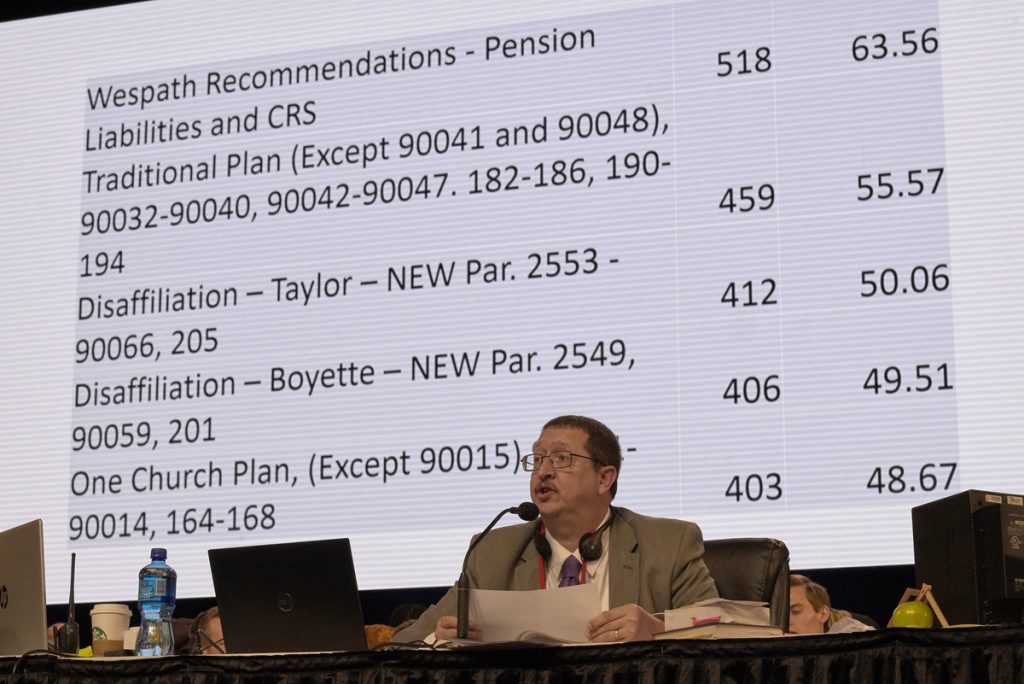In the wake of the United Methodist Church’s General Conference and the passage of legislation strengthening restrictions on the ministry of LGBTQ+ persons in the UMC, the Rev. Dr. Tom Ferguson, former Ecumenical Officer on the Presiding Bishop’s staff and former professor and Academic Dean at Bexley Hall Seabury Western Seminary, has written an excellent piece that explains what happened at the UMC General Conference. In his capacity as Ecumenical Officer, Ferguson attended several UMC General Conferences and gives insight on UMC polity that helps those of us coming from different traditions understand the implications of what took place at the conference. The Café Team commends this post to you in its entirety. The following brief excerpts explain the catalyst for the conference and offer notes on UMC polity:
“The United Methodist Church has language in its governing document the Book of Discipline which specifically states that “The practice of homosexuality is incompatible with Christian teaching. Therefore self-avowed practicing homosexuals are not to be certified as candidates, ordained as ministers, or appointed to serve in The United Methodist Church.” (Although despite many assertions that this has always been the teaching of the church, FWIW this language was not adopted by General Conference until 1972.) The Discipline also has language specifically forbidding clergy from performing same sex marriage ceremonies.
Proposals to change or amend this language have been made at the last several United Methodist General Conferences. Despite this language, there have been numerous examples of openly gay persons being ordained, and celebrations of same sex marriages. Most notably, one jurisdiction elected an openly gay, partnered person as bishop. The church’s highest body found this to be a violation of the language in the Discipline, yet did not have the authority to nullify or remove the bishop, so in turn referred those matters to the local authority which had jurisdiction. The same body which elected her is the body that has authority to discipline her, and has declined to discipline her despite the ruling. This is but one example of the ways various local authorities have found work-arounds, for lack of a better term, for the language in the Discipline.
After more debate at the 2016 General Conference, the delegates asked the bishops to try to find a way forward despite the deep divisions in the church. The bishops eventually decided to call a Special General Conference to deal solely with trying to determine a way forward on the issue of human sexuality, prior to the regularly scheduled General Conference to be held in 2020.”
Ferguson gave further context, explaining how the UMC is structured and how their polity works, a key to understanding what took place.
“Several things to keep in mind before proceeding:
i) The United Methodist Church truly is a global church, and is becoming more so. It has jurisdictions in Europe, Asia, and Africa and an enormous overseas presence. In 2004, 19% of delegates to Annual Conference were from overseas conferences, called Central Conferences. In 2016, that was over 40%. I tell Episcopalians, “Imagine if nearly half of the Episcopal Church lived in Province IX or non-US dioceses.” While far from being monolithic, the Central Conferences overall tend to be conservative theologically. Many are also located in areas which have bans against homosexuality. Russia, for instance, has laws banning “homosexual propaganda” and in my time there doing research on Christian churches, many are concerned that being connected with an American, LGBT-friendly church could open them to financial liability (fines may be levied against organizations into the thousands of dollars for “homosexual propaganda”), or having their licenses to function as churches revoked.
ii) These overseas jurisdictions, the Central Conferences, have substantial autonomous self-governance. The can legislate for themselves. However, the US-based United Methodist Church does not have this provision for self-governance. The Central Conferences thus can vote on measures in General Conference which are binding on the US-based church, but not on themselves, while the US-based church does not have this ability.
iii) The United Methodist Church has a Supreme Judicial Council (SJC) which can issue binding decisions on whether what is passed by General Conference is in violation of the Book of Discipline. The Episcopal Church simply has nothing even remotely close to this.”
To read the entire piece, please visit the Rev. Dr. Ferguson’s blog, Crusty Old Dean.

